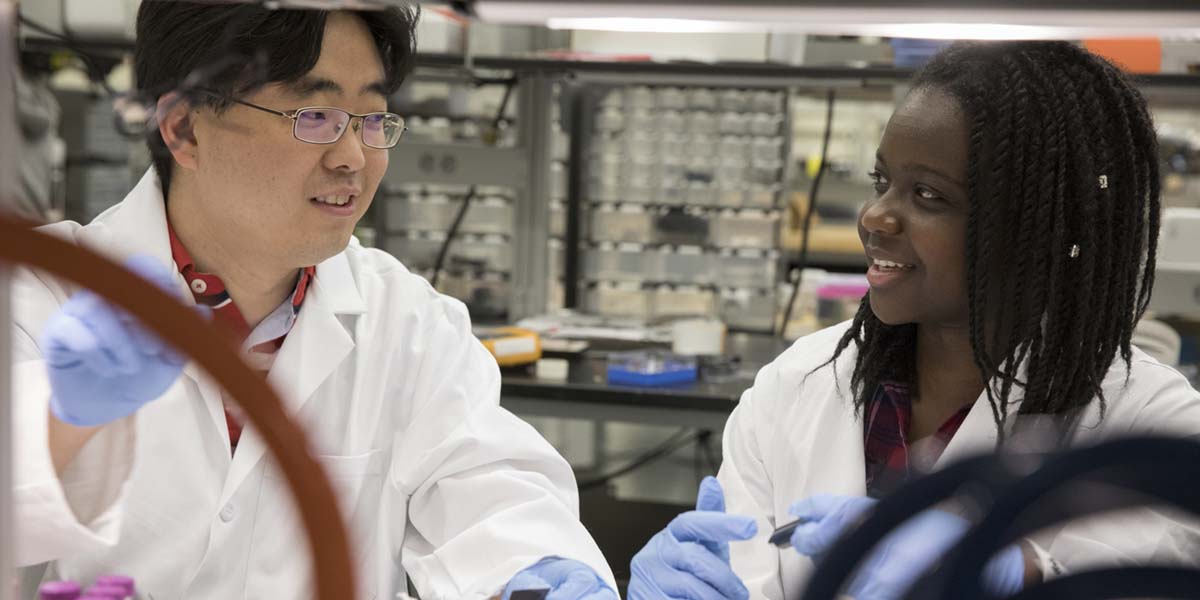ECE Department faculty explore new research for 2020-21

The Department of Electrical and Computer Engineering at the Thomas J. Watson College of Engineering and Applied Science has had a productive academic year in 2020-21, despite the ongoing challenges of the COVID-19 pandemic.
Research news
A team of researchers from Binghamton University has been selected to receive $2.6 million from the U.S. Department of Energy Solar Energy Technologies Office (SETO) to develop ways to reliably support higher amounts of solar power on the grid. Serving as principal investigator on the research is ECE Associate Professor Ziang “John” Zhang. Co-PIs include Associate Professor Ning Zhou (ECE), Assistant Professor Jian Li (ECE) and Associate Professor Lei Yu (Department of Computer Science).
Assistant Professor Emrah Akyol received a $596,295 National Science Foundation CAREER Award to explore how game theory can be used to improve communication between digital transmitters and receivers with misaligned objectives. The research also will look at truthful data-gathering strategies in behaviorally biased information networks, such as social-media algorithms.
Associate Professor Seokheun “Sean” Choi is researching a faster way to test bacteria for antibiotic resistance. The technique relies on the same principles as the batteries he has developed in the last few years: Bacterial electron transfer, a chemical process that certain microorganisms use for growth, overall cell maintenance and information exchange with surrounding microorganisms. Choi received $370,000 from the NSF to further explore this research.
Distinguished Professor Jessica Fridrich received a $768,964 NSF grant to continue her research on digital-image steganography — the science of hiding messages inside ordinary-looking photos. She is seeking a theoretically better-founded design of steganographic schemes. Currently, many data hiding methods are based on heuristics, a pragmatic approach that relies on approximations.
Assistant Professor Pritam Das received a $175,000 grant from the New York State Energy Research and Development Authority (NYSERDA) to research a system for New York City buses using extra-fast-charging (XFC) systems and extended-lifetime batteries. The all-electric system would remove 500,000 metric tons of carbon dioxide each year from the NYC metro area. Offering a matching $175,000 worth of resources are BAE Systems and C4V, a startup company based in Binghamton and mentored by Distinguished Professor M. Stanley Whittingham, who won the 2019 Nobel Prize in Chemistry for his role in the creation of the lithium-ion battery.
Associate Professor Ning Zhou’s continuing research on the future of power grids — which earned an NSF CAREER Award in 2019 — was featured in 2020’s Watson Review magazine. Zhou wants to provide a vision for power systems as fossil fuels wane and renewable energy sources take center stage. He and his team of graduate students — three PhD students and a number of master’s students at any given time — are working on both the theoretical and applied aspects of the future of power generation, transmission and distribution.
Alumni news
Matthew Gill ’18, MS ’19, was recently named the 2020 Technology Entrepreneur of the Year by the New York Small Business Development Center for his work developing virtual reality simulators for education experiences, such as those for school environments and for recruitment into trade disciplines. Gill is the founder and lead developer of Enhance-VR, a small company headquartered in Binghamton University’s Koffman Southern Tier Incubator that creates content through virtual and augmented reality technology.
